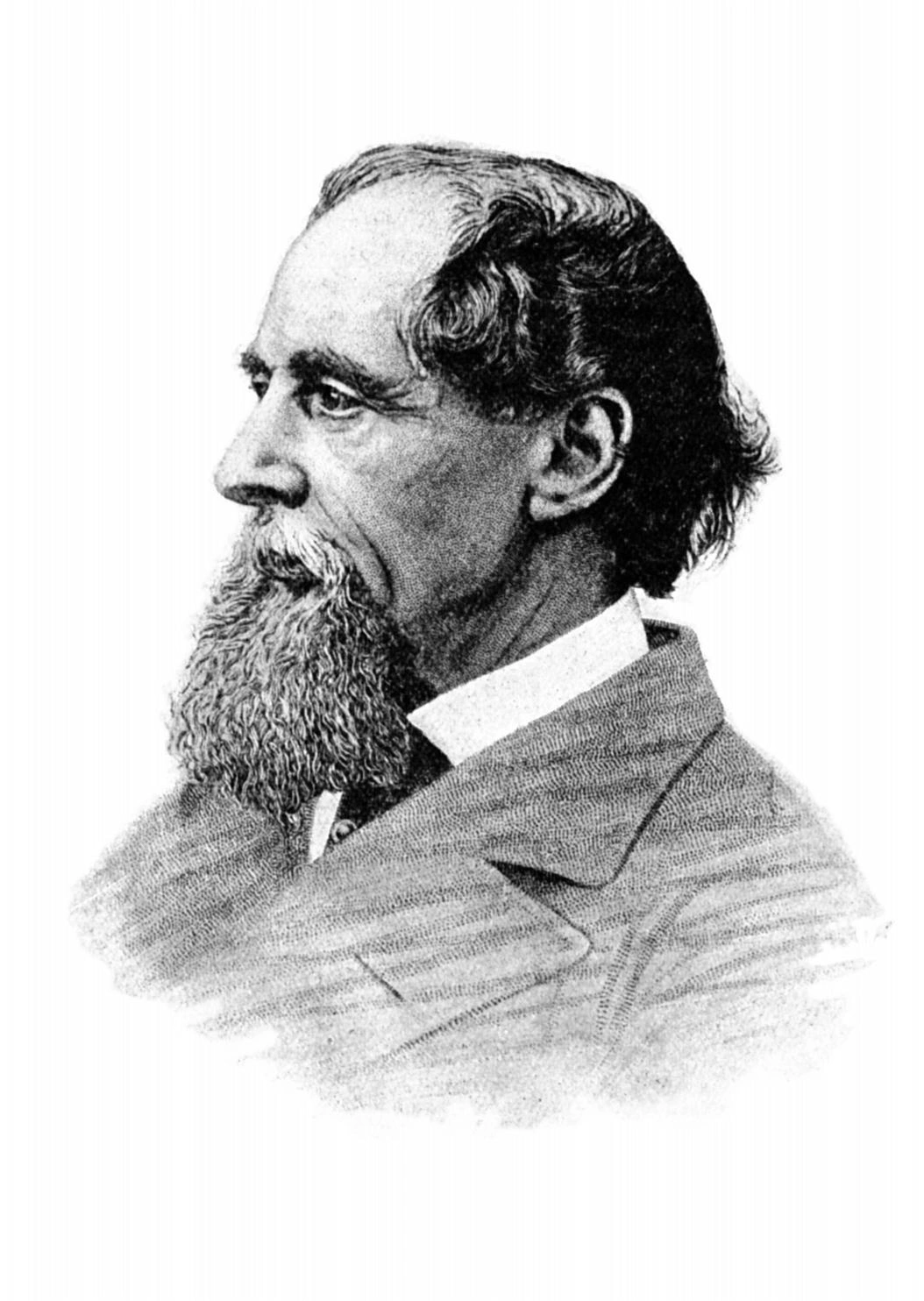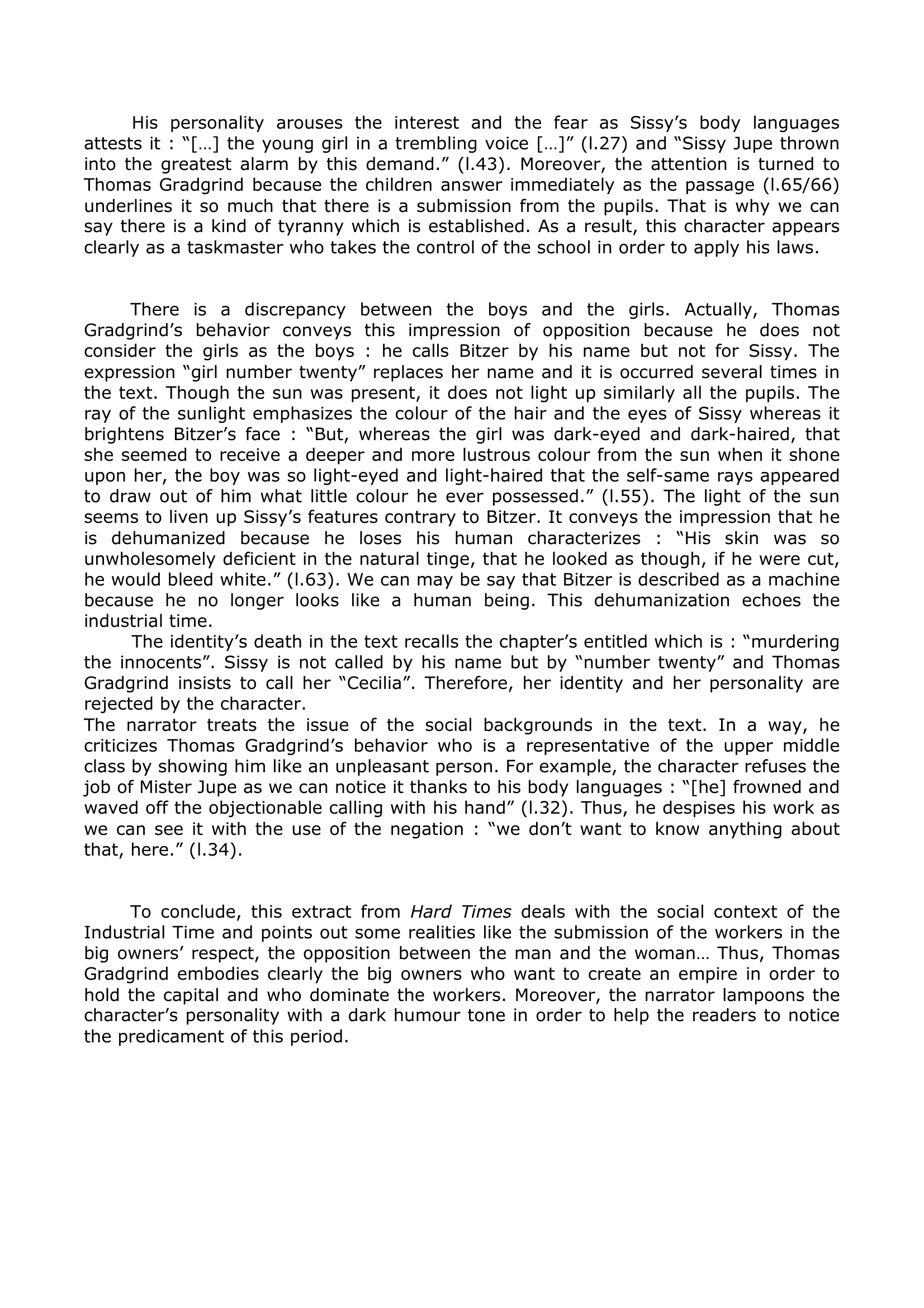COMMENTAIRE ANGLAIS : Hard Times, Charles Dickens
Publié le 01/04/2012
Extrait du document

There is hardly need to present Hard Times, Charles Dickens’ famous novel about the beginning of the industrial society which transforms the English’s landscape. The writer draws up the social portrait of the town of Coketown which turns of the epitomizing of the hell of the factory workers.

«
His personality arouses the interest and the fear as Sissy’s body languages
attests it : “[…] the young girl in a trembling voice […]” (l.27) and “Sissy Jupe thrown
into the greatest alarm by this demand.” (l.43).
Moreover, the attention is turned to
Thomas Gradgrind because the children answer immediately as the passage (l.65/66)
underlines it so much that there is a submission from the pupils.
That is why we can
say there is a kind of tyranny which is established.
As a result, this character appears
clearly as a taskmaster who takes the control of the school in order to apply his laws.
There is a discrepancy between the boys and the girls.
Actually, Thomas
Gradgrind’s behavior conveys this impression of opposition because he does not
consider the girls as the boys : he calls Bitzer by his name but not for Sissy.
The
expression “girl number twenty” replaces her name and it is occurred several times in
the text.
Though the sun was present, it does not light up similarly all the pupils.
The
ray of the sunlight emphasizes the colour of the hair and the eyes of Sissy whereas it
brightens Bitzer’s face : “But, whereas the girl was dark-eyed and dark-haired, that
she seemed to receive a deeper and more lustrous colour from the sun when it shone
upon her, the boy was so light-eyed and light-haired that the self-same rays appeared
to draw out of him what little colour he ever possessed.” (l.55).
The light of the sun
seems to liven up Sissy’s features contrary to Bitzer.
It conveys the impression that he
is dehumanized because he loses his human characterizes : “His skin was so
unwholesomely deficient in the natural tinge, that he looked as though, if he were cut,
he would bleed white.” (l.63).
We can may be say that Bitzer is described as a machine
because he no longer looks like a human being.
This dehumanization echoes the
industrial time.
The identity’s death in the text recalls the chapter’s entitled which is : “murdering
the innocents”.
Sissy is not called by his name but by “number twenty” and Thomas
Gradgrind insists to call her “Cecilia”.
Therefore, her identity and her personality are
rejected by the character.
The narrator treats the issue of the social backgrounds in the text.
In a way, he
criticizes Thomas Gradgrind’s behavior who is a representative of the upper middle
class by showing him like an unpleasant person.
For example, the character refuses the
job of Mister Jupe as we can notice it thanks to his body languages : “[he] frowned and
waved off the objectionable calling with his hand” (l.32).
Thus, he despises his work as
we can see it with the use of the negation : “we don’t want to know anything about
that, here.” (l.34).
To conclude, this extract from Hard Times deals with the social context of the
Industrial Time and points out some realities like the submission of the workers in the
big owners’ respect, the opposition between the man and the woman… Thus, Thomas
Gradgrind embodies clearly the big owners who want to create an empire in order to
hold the capital and who dominate the workers.
Moreover, the narrator lampoons the
character’s personality with a dark humour tone in order to help the readers to notice
the predicament of this period..
»
↓↓↓ APERÇU DU DOCUMENT ↓↓↓
Liens utiles
- TEMPS DIFFICILES (Les) de Dickens [Hard Times]. (résumé et analyse)
- Dickens Charles, 1812-1870, né à Portsmouth, romancier anglais.
- commentaire composé: Aline - Charles Ferdinand Ramuz
- commentaire: discours de bayeux de charles de gaulle
- Traduction + Commentaire Gatsby le magnifique en anglais

































